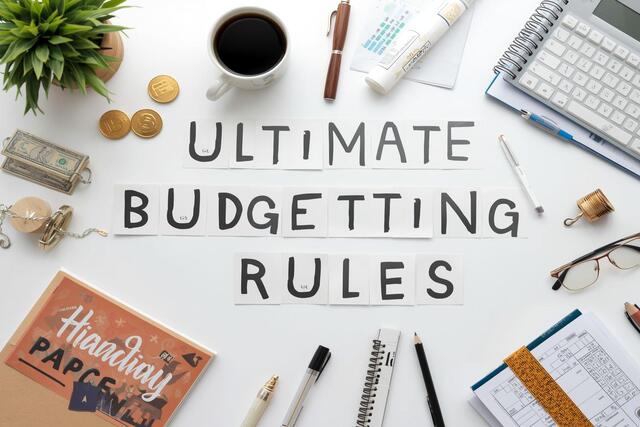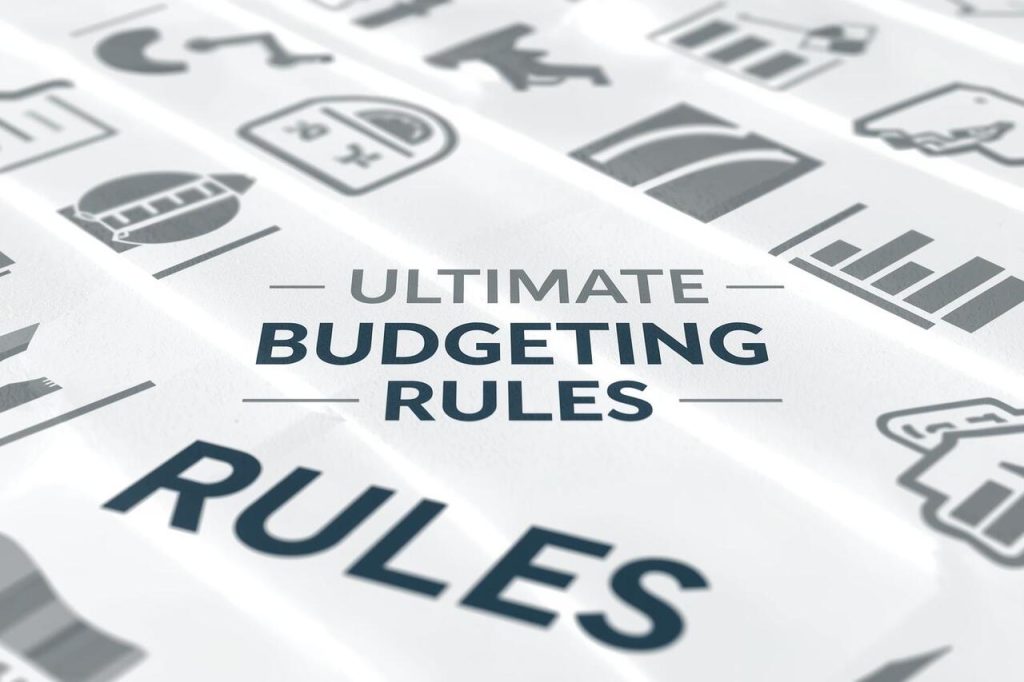7 Ultimate Budgeting Rules That Boost Productivity Instantly 💰⚡

Why Ultimate Budgeting Rules Matter for a Productive Lifestyle 🧠✨
Following clear and structured budgeting rules is like giving yourself a roadmap to success. Without a plan, money slips away unnoticed, leading to stress, poor decisions, and wasted time. But when you stick to proven strategies, you gain both financial stability and peace of mind. This reduces distractions and allows you to be laser-focused on your goals.
The Link Between Money Management and Productivity 💡
Money stress is one of the biggest productivity killers. People who follow effective ultimate budgeting rules experience less anxiety, better time management, and a sharper focus on their daily priorities. Simply put, financial clarity equals mental clarity—and that’s the ultimate productivity hack.
Read more: 5 Fool‑Proof Budgeting Apps That Make Expense Tracking Effortless
7 Ultimate Budgeting Rules That Boost Productivity Instantly ⚡
Now let’s dive into the most powerful budgeting rules that can help you take control of your money and maximize your productivity.
1. Follow the 50/30/20 Rule 📊
The 50/30/20 budgeting rule is one of the simplest yet most powerful strategies. It suggests spending 50% of your income on needs (housing, food, bills), 30% on wants (entertainment, dining out), and saving or investing the remaining 20%. By breaking your expenses into clear categories, you avoid confusion and guilt when spending. This structure keeps you financially disciplined and helps you stay focused on your personal and professional goals without constant money worries.
2. Always Pay Yourself First 💵
One of the golden budgeting rules is to treat savings like a mandatory expense. Every time you receive your paycheck, set aside a portion—no matter how small—before paying bills or buying extras. This habit builds long-term financial security and eliminates the constant fear of “not having enough.” Knowing that your savings are growing gives you the peace of mind needed to work with confidence and higher productivity levels.
3. Track Every Expense Diligently 📱✍️
Tracking expenses may sound boring, but it’s one of the smartest budgeting rules to follow. Whether you use an app, a spreadsheet, or even a notebook, keeping a record of every transaction makes you more conscious of your habits. This prevents impulsive spending and creates accountability. When you see where every dollar goes, you can make better decisions quickly, freeing up valuable time and mental energy.
4. Limit Impulse Purchases 🛍️❌
Impulse shopping is a silent productivity killer. Each time you buy something unplanned, you not only waste money but also distract yourself from long-term goals. One effective ultimate budgeting rule is the “24-hour rule.” Whenever you feel the urge to buy something, wait a full day before making the purchase. Most of the time, you’ll realize you don’t really need it. This practice not only protects your wallet but also trains your brain to stay focused and disciplined.
5. Automate Your Finances 🔄💳
Automation is a game-changer when it comes to ultimate budgeting rules. By setting up automatic transfers to savings or investment accounts, and scheduling bill payments, you eliminate the risk of forgetting and late fees. Automation saves time, reduces stress, and ensures consistency in your financial plan. With less time spent worrying about payments, you can focus more on productive work and personal growth activities.
6. Regularly Review and Adjust Your Budget 📅📝
Life changes, and so should your budget. Reviewing your spending and savings monthly helps you identify areas where money leaks are happening. This rule ensures that you stay on track with your evolving goals and lifestyle. When you adapt quickly, you prevent financial stress from building up. A flexible budget equals a flexible mind—allowing you to stay creative and productive at work and in personal projects.
7. Prioritize Debt Repayment 🚫💳
High-interest debt drains not just your money but also your mental energy. One of the most essential budgeting rules is to aggressively pay off debt before focusing on luxuries. Whether you choose the snowball method (smallest debt first) or the avalanche method (highest interest first), becoming debt-free boosts your confidence and productivity instantly. Without the constant stress of looming payments, you can invest your energy into meaningful tasks and future goals.
Deep Practical Guide: How to Live the Ultimate Budgeting Rules Every Day 💡💰
When people hear the phrase Ultimate Budgeting Rules, many imagine rigid spreadsheets, endless restrictions, or a life without pleasures. That’s a false picture. The true power of the ultimate budgeting rules lies in how they become part of your daily routine—quietly shaping decisions, leveling stress, and freeing your time and attention for what matters most. Below you’ll find an extended, practical guide to living these principles day-to-day, with real-life examples, mini-templates you can copy, and rituals that make sticking to a budget feel natural rather than punitive. 🚀
Read more: 10 Expert‑Approved Tips to Boost Your Productivity & Financial Health
Turn Theory into Habit: The First 30 Days
Changing a money habit is similar to starting a fitness routine: it requires small, consistent actions repeated over time. The first 30 days of adopting the Ultimate Budgeting Rules are the most important because you are laying the neural tracks that will determine long-term behavior. Start with a simple daily ritual: each morning, spend five minutes reviewing your spending plan for the day. This act primes your mind to notice choices ahead—will you eat out, or bring lunch? Will you browse shopping apps, or focus on work tasks that could earn you extra income?
On day one, set one measurable micro-goal. Example: reduce daily coffee shop spending by 50%. On day seven, measure progress and adjust. By day thirty, the small win compounds into a meaningful monthly saving. These micro-goals are aligned with the Budgeting Rules because they prioritize intention over impulse. Over time, intentionality becomes automatic.
Real-Life Example: The Freelancer Who Regained Focus
Consider Rina, a freelancer who used to check her bank balance multiple times a day, which created anxiety and broke her focus. She applied a few elements of the Ultimate Budgeting Rules—she automated a fixed savings transfer every payday, set a capped “fun” allowance, and started a weekly 20-minute money review every Sunday evening. Within two months, Rina reported less financial anxiety, regained blocks of uninterrupted work time, and increased her billable hours. The financial discipline created mental space that translated directly into income growth. This is the practical payoff of following the ultimate budgeting rules: money systems that protect your attention.
Crafting an Intentional Monthly Money Ritual
Rituals anchor habits. Create a monthly money ritual that feels meaningful rather than mechanical. On the last Saturday of each month, do a 45-minute session with these steps: review last month’s spending, move any surplus into savings or investments, decide one “experimental” allocation for the coming month (e.g., increased learning budget), and write one short gratitude note about a non-monetary win. Including a gratitude practice reduces the emotional pressure around finances and reinforces positive behavior. When you view your budget through the lens of the Ultimate Budgeting Rules, it becomes not only a ledger but a life-design tool.
Design Your Week Using Financial Windows
Another practical habit is to set a weekly “financial window”—a fixed 30 to 60-minute slot dedicated to all money tasks. Use this window to pay bills, batch online purchases, reconcile transactions, and plan small transfers. Batching reduces task-switching and reduces the cognitive cost of money management. The weekly window is a behavioral anchor that supports the Ultimate Budgeting Rules by consolidating decisions and protecting your productive hours from interruptions.
Micro-Budgets for Different Areas of Life
Break your monthly plan into micro-budgets aligned with your values: home, food, learning, health, social life, and creative work. Each micro-budget has its own intention. For example, the learning budget might be devoted to books, short courses, or a membership that helps you earn more later. This “money by purpose” approach, rooted in the Ultimate Budgeting Rules, clarifies trade-offs—when you choose to spend $50 on entertainment, you can see exactly what else that $50 could have funded.
Practical Templates You Can Copy (Daily, Weekly, Monthly)
Here are three simple templates to daily, weekly, and monthly check-ins. You can paste these into a note app and use them as your financial rituals.
Daily 3-Minute Check:
– What is today’s main spending risk?
– One small thing I can do today to save $X.
– Quick mood check—money worry level (1–5).
Weekly 20-Minute Window:
– Reconcile transactions this week.
– Move any leftover “fun” to savings or roll over.
– Set one micro-goal for income or savings for next week.
Monthly 45-Min Ritual:
– Total income vs. plan.
– Biggest surprise expense and how to avoid next month.
– Allocate an “experiment” fund (small).
– Celebrate one non-financial success.
How to Talk About Money Without Stress
Money conversations can be loaded—but they don’t have to be. The Ultimate Budgeting Rules are not only for numbers; they also apply to communication. When discussing money with a partner, start from curiosity: ask about priorities, fears, and deadlines. Craft shared goals rather than ‘rules’ that feel imposed. Use non-blaming language—“I noticed we spent X on subscriptions; can we review?”—and schedule a short monthly money date rather than sporadic crisis talks. Over time, this gentle practice reduces emotional friction and helps you apply the ultimate budgeting rules collaboratively.
Mindset Shifts That Make Budgets Work
The difference between someone who follows the Ultimate Budgeting Rules for decades and someone who fails at them is less a matter of math and more a matter of mindset. Replace scarcity thinking (“I can never afford X”) with allocation thinking (“I choose where this money goes”). When you make allocation the frame, every spending decision becomes intentional. Celebrate constraints as creativity fuel: a modest budget can encourage resourcefulness, new skills, and better planning.
Case Study: How Small Adjustments Scaled a Side Hustle
Arif ran a small online store and found that unpredictable cash flow reduced his capacity to plan promotions. He implemented a few Budgeting Rules practices: he separated business and personal accounts, automated a small reinvestment percentage from each sale, and kept a short-term cash buffer for ad spend. Within three months, Arif had a steady promotional budget that allowed him to test ads without fear. The business grew, and his stress decreased—because the budget system removed guesswork and allowed him to focus on creative work instead of constant firefighting.
Turning Savings into a Game
If discipline feels heavy, gamify it. Set small milestones and reward yourself modestly when you hit them. Use visual trackers or charts to watch small wins accumulate. This approach aligns beautifully with the Ultimate Budgeting Rules because it rewards consistency rather than perfection. A simple example: every $100 saved goes into a jar; when the jar reaches $500, you treat yourself to a small, planned celebration. The psychological lift from visible progress keeps the system sustainable.
How to Handle Emergencies Without Derailing Momentum
Emergencies will happen, but the worst outcome is letting a single shock throw you off for months. Build a small “buffer cushion” within your checking account—a few weeks of regular bills—so a one-off expense doesn’t force immediate changes to your long-term plan. If a larger emergency occurs, use a temporary “pause and replan” method: stop discretionary spend for two weeks, assess the true impact, then adjust your next month’s plan in a controlled way. This keeps you aligned with the Ultimate Budgeting Rules by maintaining calm, data-driven responses.
Practical Saving Techniques That Fit Busy Lives
Busy people need simple, low-friction saving techniques. One effective method is “round-up saving,” where purchases are rounded up to the nearest whole number and the difference is saved. Another is “salary split,” where you split your paycheck into multiple accounts immediately—one for bills, one for spending, one for savings. These tactics are direct implementations of the Ultimate Budgeting Rules and make saving passive and painless.
When to Call a Professional (and When Not To)
Most people can implement the core principles of the Ultimate Budgeting Rules on their own, but there are moments when professional help accelerates progress. If you have complex tax situations, significant investment portfolios, or persistent debt that you can’t seem to reduce, a certified financial planner or debt counselor can provide tailored strategies. For simpler needs, online courses, community groups, and trusted budgeting apps are often sufficient and cost-effective.
How to Make Your Budget Adapt to Life Changes
Life isn’t static; budgets shouldn’t be either. When major events happen—job change, new child, moving cities—treat the budget as a living document. Re-evaluate priorities, adjust micro-budgets, and reset timelines. The Ultimate Budgeting Rules emphasize adaptability as much as discipline. By viewing your budget as a map rather than handcuffs, you keep your financial system supportive rather than restrictive.
Read more: 8 Actionable Steps to Create a Foolproof Spending Tracker System
Small Rituals That Preserve Focus
Adopt tiny rituals that protect both your money and your attention. A simple example: every payday, after automation completes, spend three minutes noting one thing you’ll do with the extra mental space that the automation created (e.g., focus on a high-priority project for 90 minutes). These rituals link financial systems to productive behavior and reinforce why the Ultimate Budgeting Rules matter beyond numbers.
Learning from Setbacks Without Losing Momentum
Setbacks are not failures; they’re data. When you overspend or miss a saving target, analyze what triggered the behavior, adjust the plan, and move on. The healthiest financial practice is compassion plus accountability. Use a brief post-mortem approach: describe what happened in one paragraph, decide one corrective action, and then take that action. This iterative learning keeps you progressing under the umbrella of the Budgeting Rules.
How to Communicate Budget Wins to Your Household
When you live with others, budget Wins are shared Wins. Make a habit of a short monthly family update where you celebrate one saving milestone and share one financial learning. This positivity helps others see the value of the system and creates a collective momentum toward the goals implied by the Ultimate Budgeting Rules. When everyone understands how small changes compound, cooperation becomes easier.
Tools and Apps that Respect Your Time
Pick tools that fit your style. Some prefer minimalist spreadsheets; others rely on automated apps that categorize transactions. The best tool is the one you will actually use consistently. Whatever you choose, ensure it supports automatic transfers, easy categorization, and visual reports. These features transform abstract rules into daily habits that continue to operate while you focus on productive work—exactly the outcome the Ultimate Budgeting Rules aim to create.
Micro-Practice You Can Start Tonight
Before you sleep tonight, take five minutes to write down three things: one expense you will cut for the next week, one small transfer you will automate tomorrow, and one skill you will invest in within the next month. These mini-decisions, repeated nightly, cultivate discipline and momentum. Over time, they become the living expression of the Ultimate Budgeting Rules—simple, human, and profoundly effective.
By weaving these practices into your daily life, the Budgeting Rules stop being a checklist and become a lifestyle: calmer, clearer, and more productive. Use this extended guide as a companion to your main article—place it directly above Final Thoughts and let readers absorb the tools that turn ideas into results. 🌟
Read more: 6 Risk-Free Ways to Build an Emergency Fund Fast
FAQs About Ultimate Budgeting Rules ❓💬
1. What are ultimate budgeting rules and why are they important?
budgeting rules are proven strategies to manage money effectively. They help you allocate income, control spending, and save consistently. Following them reduces financial stress and improves productivity.
2. Which budgeting rule is best for beginners?
The 50/30/20 rule is ideal for beginners because it’s simple and easy to apply. It divides your income into needs, wants, and savings, making money management straightforward.
3. How do ultimate budgeting rules improve productivity?
When you follow clear budgeting rules, you reduce financial stress and decision fatigue. This frees up mental energy, allowing you to focus better on work and personal growth activities.
Final Thoughts 🌟

Effective ultimate budgeting rules are more than just money-saving strategies—they’re productivity boosters. By applying the 7 ultimate rules we’ve discussed, you can achieve financial stability, reduce stress, and unlock your full potential. Start small, stay consistent, and remember: disciplined finances lead to a disciplined life. With clarity in your budget, you’ll enjoy clarity in your mind—and that’s the ultimate recipe for success. 💯
For more insights on personal finance, you can explore
Investopedia,
and if you want practical money management tools, visit
NerdWallet.


